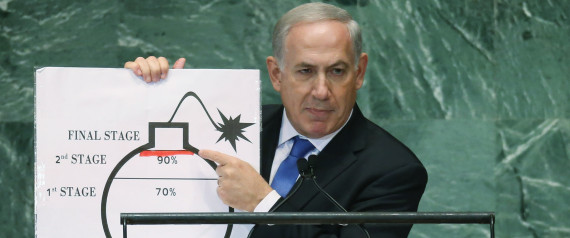
To Israeli Prime Minister Benjamin Netanyahu, peace between the US and Iran is an existential threat. By now, it should be clear to all: It’s not an Iranian nuclear bomb he fears, but a US-Iran deal.
In a tweet earlier this morning, the Prime Minister said as much: “We are strongly opposed to the agreement being formulated between the world powers and Iran that could endanger Israel’s very existence.”
So we have gone from Netanyahu declaring an Iranian bomb an existential threat to Israel, to a deal between the world powers and Iran an existential threat.
And it’s not the specifics of the deal that is the problem, but the very notion of a deal involving the US and Iran. In fact, his Minister of Defense declared that any dealwould be a threat.
Netanyahu’s hypocrisy is astounding. As I describe in A Single Roll of the Dice — Obama’s Diplomacy with Iran, Netanyahu has always opposed diplomacy with Iran. Not because he feared it would fail, but precisely because he feared it would work. When President Obama took office in 2009 and began his outreach to Tehran, Netanyahu launched a campaign to undermine Obama centered on four key areas.
First, he pressed Congress to impose new sanctions on Iran before talks began, presumably to ensure that the escalatory measure would ensure that diplomacy never took off at all. Second, he pressed Obama to adopt the Bush administration’s completely unrealistic goal to eliminate all Iranian uranium enrichment. Again, such a measure would ensure that diplomacy never took place — the breakthrough in diplomacy took place once the US dropped that demand.
Third, Netanyahu wanted Obama to continue Bush’s rhetoric of insisting that the military option remained on the table. Obama had famously stated that the conflict with Iran could not beresolved by issuing threats, and wanted to create an atmosphere conducive to diplomacy. Making war threats would achieve the opposite, which Netanyahu undoubtedly understood.
During their first joint press conference in the Oval office in May 2009, President Obama carefully avoided mentioning military options in regards to Iran, since he was hoping to begin talks with Tehran as soon as the Iranian Presidential elections in June would be over. But if Obama wasn’t going to mention the military option, Netanyahu would do it for him.
As soon as he got the word, the Israeli prime minister turned to Obama and thanked the American President for “your statement that you’re leaving all options on the table.” But Obama had made no such statement.
Netanyahu’s final measure to sabotage talks was to insist on a very tight timeline for negotiations. Talks should be concluded in 12 weeks, the Israelis insisted. Absent such a tight deadline, the Iranians would simply play for time, the Netanyahu government argued. How such a complex conflict, dating back three decades, could be resolved in three months was never explained. Tellingly, Netanyahu did not insist on a deadline for either sanctions or military action. Such measures should be open-ended, only diplomacy benefitted from an impossible deadline.
Having insisted on a 12-week deadline for the talks, accusing the Iranians of playing for time, declaring the interim nuclear agreement from November 2013 a “very bad deal” only to later admit to Obama administration officials that the deal has been very successful, the Israeli prime minister is now expected to seek congressional support to delay any agreement with Iran. Apparently, Obama has negotiated a deal too quickly.
Nobody in the Obama administration believes that Netanyahu is trying to advance the chances of a nuclear deal. Fewer and fewer people in the US media believe that Netanyahu is doing anything but trying to push the United States and Iran towards war. In fact, AIPAC was instructing its citizen lobbyists to tell US lawmakers that war with Iran is preferable to the unacceptability of the status quo, i.e. Obama’s nuclear deal.
To understand Netanyahu’s message this week in Washington, one must understand that to those who crave war, peace is an existential threat.
This piece originally appeared in The Huffington Post.
Back to top